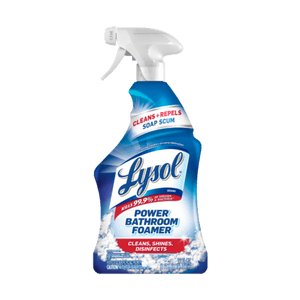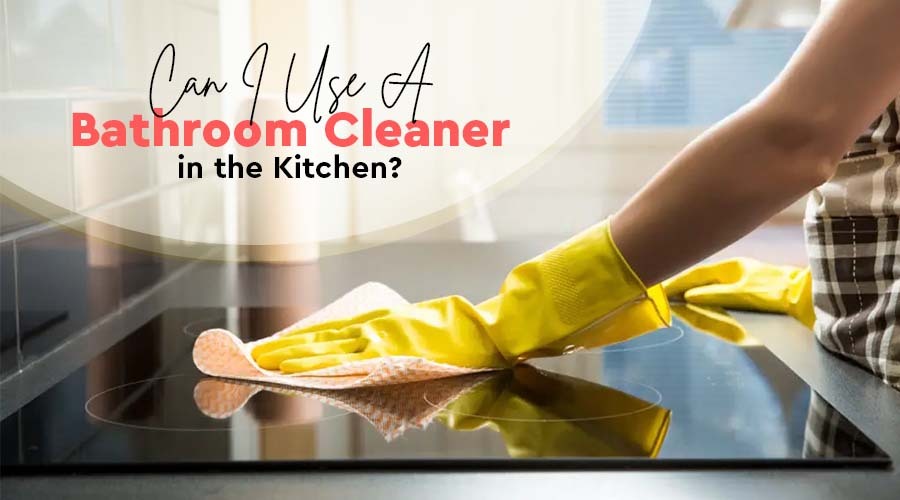Are you standing in your kitchen, wondering if that bottle of Lysol Bathroom Cleaner could do double duty? You’re not alone.
Many of us are looking for ways to simplify our cleaning routines and maximize the use of products we already have. But when it comes to your family’s health and the safety of your kitchen surfaces, you might be hesitant.
Could using a bathroom cleaner in your kitchen really be a smart move, or could it cause more harm than good? We’ll uncover the truth about using Lysol Bathroom Cleaner in the kitchen, so you can make an informed decision and keep your home sparkling clean without second-guessing. Keep reading to learn the surprising facts that might just change the way you see your cleaning supplies.

Credit: www.amazon.com
Lysol Bathroom Cleaner Composition
When you think about cleaning your kitchen, Lysol Bathroom Cleaner might not be the first product that comes to mind. Yet, if you ever wondered why it works so well in the bathroom, you might find its composition intriguing and potentially useful for kitchen cleaning tasks. Let’s dive into what makes this cleaner tick and consider its application beyond the bathroom.
Understanding The Ingredients
Lysol Bathroom Cleaner is composed of various chemicals designed to tackle tough stains, soap scum, and germs. The active ingredients usually include citric acid and alkyl dimethyl benzyl ammonium chloride, which are potent at breaking down grime and killing bacteria.
Citric acid is known for its ability to dissolve mineral deposits and grease, making it potentially useful for kitchen counters and appliances. Meanwhile, the ammonium chloride acts as a disinfectant, ensuring surfaces are germ-free.
Safety In Different Spaces
While the composition is effective, safety is paramount. You might be concerned about using bathroom cleaners in the kitchen due to food safety. It’s crucial to rinse any surface thoroughly after using Lysol to avoid chemical residues where food is prepared.
Consider the surfaces you’re cleaning. While tiles and stainless steel might benefit from a deep clean, porous surfaces like wood could absorb chemicals, leading to potential contamination.
Personal Experiences And Practical Use
I once used Lysol Bathroom Cleaner to tackle a stubborn grease spot on my kitchen stove. It worked wonders, leaving the surface sparkling clean. However, I was meticulous in rinsing to ensure no cleaner remained.
Think about those difficult spots in your kitchen. Could Lysol Bathroom Cleaner save you time and effort? It’s worth experimenting cautiously to see if it fits your cleaning routine.
Thoughts On Versatility
As you ponder using bathroom cleaner in the kitchen, consider its versatility. How many products do you need for different tasks? Sometimes, a multipurpose approach can simplify cleaning.
Yet, always weigh the benefits against potential risks. Is the convenience worth the extra effort of rinsing? Would you rather stick to kitchen-specific cleaners?
Exploring Lysol’s composition might open up possibilities for your cleaning arsenal. Just ensure you’re informed about safety and practicality. Would you give it a try, or do you prefer to keep cleaning products strictly compartmentalized? Your decision could redefine your cleaning strategy.

Credit: www.lysol.com
Differences Between Bathroom And Kitchen Surfaces
When it comes to cleaning, the surfaces in your bathroom and kitchen might seem similar. However, they have distinct differences that can affect how you clean them. Understanding these differences is crucial, especially if you’re considering using Lysol Bathroom Cleaner in your kitchen. This knowledge not only helps you choose the right cleaning products but also keeps your home safe and hygienic.
Bathrooms are often filled with moisture. Tiles, glass, and porcelain are common materials. These surfaces handle humidity well, but they can harbor soap scum and mold. You’ve probably scrubbed your shower door more times than you can count. Lysol Bathroom Cleaner is designed to tackle these stubborn bathroom residues.
In contrast, your kitchen is a hub of food preparation. Countertops, cutting boards, and sinks frequently come into contact with food. You may find surfaces made of granite, stainless steel, or laminate. These materials require cleaners that can remove grease and food particles without leaving harmful residues.
Why Surface Material Matters
The material of each surface dictates the type of cleaner you should use. Porcelain and tile can withstand acidic cleaners like Lysol, which effectively remove mold and mildew. Have you ever noticed that bathroom tiles sparkle after a good clean?
Kitchen surfaces, however, need more gentle care. Acidic cleaners can damage granite and stainless steel, leaving dull spots. You want your kitchen to look as inviting as it smells, right?
Using Lysol Bathroom Cleaner in the kitchen can be risky. It may leave residues that could contaminate food. Imagine making a sandwich on a countertop cleaned with an unsuitable product. The thought is unappetizing, isn’t it?
Additionally, bathroom cleaners might damage kitchen surfaces over time. You want your granite countertops to last, not show wear and tear from improper cleaning.
Finding The Right Cleaner For Each Room
Choosing the right cleaner for each room is essential. Look for products specifically designed for kitchen use. They are formulated to clean without damaging surfaces or leaving harmful residues. Have you ever used a cleaner that made your kitchen smell fresh and inviting?
Consider multi-surface cleaners that cater to both bathroom and kitchen needs. These can simplify your cleaning routine while ensuring safety across all surfaces.
Now, think about this: How confident are you that you’re using the right cleaner for your home? The right product can make all the difference in maintaining a safe and welcoming environment.
Potential Risks Of Using Bathroom Cleaner In The Kitchen
Using Lysol Bathroom Cleaner in the kitchen may pose potential risks. Ingredients designed for bathroom grime can contaminate food surfaces, leading to health concerns. Always ensure cleaning products match their intended use to maintain kitchen safety.
Potential Risks of Using Bathroom Cleaner in the Kitchen Using Lysol Bathroom Cleaner in the kitchen might seem convenient. It cleans effectively, removing germs and grime. But it’s essential to consider potential risks. Kitchen surfaces often contact food and utensils. Using bathroom cleaner here can introduce hazards.Chemical Residue Concerns
Bathroom cleaners have strong chemicals. These chemicals target tough bathroom stains. In the kitchen, they might leave residue. This residue can linger on countertops and appliances. Over time, it might build up. Cleaning processes may not fully remove it. Such residue can pose health risks.Impact On Food Safety
Food safety is crucial in kitchens. Chemical residues can contaminate food. Even trace amounts can be harmful. Cooking or preparing food on treated surfaces can transfer chemicals. This contamination risks ingesting harmful substances. It can affect taste and safety. Always prioritize cleaners designed for kitchen use.Safe Alternatives For Kitchen Cleaning
Using Lysol Bathroom Cleaner in the kitchen might not be the best choice. The kitchen requires specific cleaning solutions to ensure food safety. Let’s explore safe alternatives for kitchen cleaning. These alternatives keep your kitchen clean and healthy.
Natural Cleaning Solutions
Natural cleaning solutions can be effective in the kitchen. Vinegar is a popular choice for removing grease. It also disinfects surfaces. Baking soda helps scrub stubborn stains. It is gentle on kitchen surfaces. Lemon juice acts as a natural disinfectant. It leaves a fresh scent too. These natural options are safe for food contact areas.
Kitchen-specific Cleaners
Kitchen-specific cleaners are designed for culinary spaces. They tackle grease and grime efficiently. These cleaners are safe for countertops and cutting boards. Look for products labeled as food-safe. This ensures your kitchen remains hygienic. Always read labels for proper usage instructions. Kitchen-specific cleaners provide peace of mind. They help maintain a clean cooking environment.
Best Practices For Using Cleaners In Different Areas
Using the right cleaner for each area in your home is important. Different rooms have different cleaning needs. Bathrooms and kitchens, for instance, face distinct challenges. To maintain hygiene, you must select appropriate products. Using bathroom cleaners in the kitchen might not always be safe. Understanding the best practices for using cleaners in different areas is essential.
Reading Product Labels
Always read the product label before using any cleaner. Labels provide crucial information. They tell you where you can use the product. Some cleaners are only for specific areas. A bathroom cleaner might not suit kitchen surfaces. Labels also list active ingredients. This helps you know what chemicals you are using. It can prevent harmful effects on food-preparation areas.
Safe Storage Tips
Proper storage of cleaning products is crucial for safety. Keep all cleaners in a cool, dry place. Ensure they are out of reach of children and pets. Never store them near food items. Use original containers with labels. This avoids confusion about the product’s purpose. Lock cabinets if possible. This prevents accidental access by kids or pets.
Expert Opinions And Recommendations
Cleaning products are essential in every home. Lysol Bathroom Cleaner is a popular choice. But can it be used in the kitchen? Expert opinions and recommendations can help decide. They provide clarity and guidance. Understanding these insights ensures safe and effective cleaning.
Insights From Health Experts
Health experts have clear advice. Bathroom cleaners often contain strong chemicals. These chemicals are effective against germs. But they might not be safe for kitchen surfaces. Kitchens have food. Strong chemicals can contaminate food. This poses health risks. Experts suggest using kitchen-specific cleaners. These are safer for food areas.
Manufacturer Guidelines
Manufacturers provide crucial information. Lysol has specific instructions for their products. They design bathroom cleaners for bathroom use. Their labels often state this. Following these instructions ensures safety. Ignoring them can lead to problems. Manufacturer guidelines are there for a reason. They help in using products correctly. Always check labels before using any cleaner.

Credit: fominsoap.com
Frequently Asked Questions
Is Lysol Bathroom Cleaner Safe For Kitchen Use?
Lysol Bathroom Cleaner is not recommended for kitchen use. It is formulated specifically for bathroom surfaces. Using it in the kitchen may lead to contamination of food-preparation areas. Opt for Lysol Kitchen Cleaner instead, which is designed to safely clean kitchen surfaces without posing health risks.
Can Lysol Bathroom Cleaner Disinfect Kitchen Surfaces?
Lysol Bathroom Cleaner can disinfect, but it’s better suited for bathroom surfaces. For kitchens, choose Lysol Kitchen Cleaner for effective sanitation. It’s formulated to tackle food-related germs and is safer for areas where food is prepared. Always follow usage instructions for the best results.
What Are Alternatives To Lysol Bathroom Cleaner?
Consider using Lysol Kitchen Cleaner for kitchen surfaces. Other alternatives include vinegar-based cleaners, baking soda, or specialized kitchen sanitizers. These options are safe, effective, and designed for food-preparation areas. Ensure you use products that are non-toxic and food-safe when cleaning kitchen spaces.
Why Avoid Bathroom Cleaners In The Kitchen?
Bathroom cleaners often contain chemicals not suitable for food-contact surfaces. Using them in kitchens can lead to residue that may contaminate food. Always choose cleaners specifically designed for kitchen use to ensure safety and hygiene, keeping food-preparation areas free from harmful substances.
Conclusion
Lysol bathroom cleaner is effective for tough stains. But is it safe for kitchens? Not always. Kitchen surfaces need food-safe products. Using bathroom cleaner might risk contamination. Read labels carefully. Choose cleaners designed for kitchen use. Look for options labeled safe for food areas.
This ensures a clean, safe kitchen environment. Lysol is great for bathrooms, but kitchens require special care. Always prioritize safety when selecting cleaning products. Keep your kitchen clean and safe with the right choices. Proper cleaning protects your health and food quality.
Make smart decisions. Your kitchen deserves the best care.

As the chief content writer, Hassan Al Sarker works as a professional kitchen-based content creator at Kitchen Liker.
In addition to reviewing the content published on Kitchen Liker, he ensures that it is accurate, relevant, and helpful. As a result, all the reviews and information published at Kitchen Liker are neutral and userfriendly.
Hassan Al Sarker has a bachelor’s degree in Hotel and Tourism Management From the Newyork University. Before joining Kitchen Liker, he was a contributor at Kitchen Club, United States.
